CIPSH, the International Council for Philosophy and Human Sciences (Conseil International de la Philosophie et des Sciences Humaines), announces a new initiative designed to highlight and encourage existing research networks of centers of research in the humanities and to attract greater attention to the humanities worldwide and enhanced recognition of their importance in contemporary society.
The aim is to endorse and publicize the establishment as academic humanities chairs of such networks, oriented towards a general theme and headed by one chairholder at universities or other recognized research institutions; the chairholder will be supported by a team of several associates in the host institution and, preferably, in one or more different institutions and, if possible, in one or more other countries. Ideally, the designated theme or project should be interdisciplinary in nature, and one or more of the supporting institutions should be located in a country or countries different from that of the host institution. The initial appointment of a chairholder will be for a period of five years, with the possibility of renewal following favorable evaluation.
The new CIPSH chairs are not intended to be in competition with already-existing programmes, namely UNESCO chairs. In fact, it would be possible for an individual and a center to hold both at one time. However, it is hoped that the humanities orientation of the CIPSH chairs, as well as other considerations, will attract a broad and diverse pool of distinguished applicants and that the designation of “CIPSH Chair” will carry with it a special prestige of its own.
CIPSH Chair
Click each of the chairs below to read more.
CIPSH-UCI Chair on New Humanities

CIPSH-UCI Chair on New Humanities, at University of California at Irvine (chair holder: Prof. Hsiung Ping-Chen). The “New Humanities” CIPSH Chair, is established at the School of Humanities, University of California, Irvine, in close partnership with Xiamen University and Chinese University of Hong Kong. UCI’s proposed CIPSH Chair in “New Humanities” will both initiate individual projects at our university and coordinate linked thematic projects carried out by scholars within the network. In this way, the impact of a CIPSH Chair at UCI will be made at multiple levels – by individual researchers through their own scholarship, by collaborative teams developing new methodologies and breaking ground in new subfields, and by networks of scholars and institutions through conferences and publications of the resulting scholarship. UCI’s CIPSH Chair in “New Humanities” will foster a global network of academic institutions and scholars who are engaged in projects that push the boundaries of disciplines and methodologies in the humanities.
CIPSH-UL Chair on Ethnolinguistic Vitality and Diversity
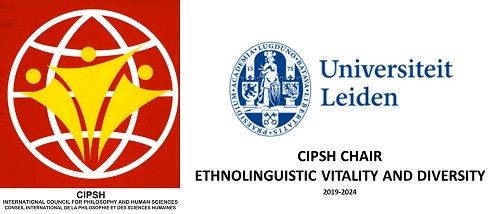
CIPSH-UL Chair on Ethnolinguistic Vitality and Diversity, at Leiden University (chair older Prof. Felix K. Ameka). The chair on ethnolinguistic vitality and diversity wants to advance research and practice of language documentation. The chair wants to develop several activities that promote and increase interest in the advantages of linguistic diversity, multilingualism and the maintenance of the vitality of minority and threatened languages. In doing this the chair wants to promote a language policy based on diversity, which must lead to a better knowledge of cultures and of the richness of different cultures, which is one of CIPSH’s priorities. The chair will build a network between important universities and other research institutes in order to offer both teaching and training, summer schools, workshops and conferences. This fits in perfectly well with the CIPSH mission statement to highlight and encourage existing research networks of centers of research in the humanities and to attract greater attention to the humanities worldwide and enhanced recognition of their importance in contemporary society.
CIPSH-UA Chair on Global Studies
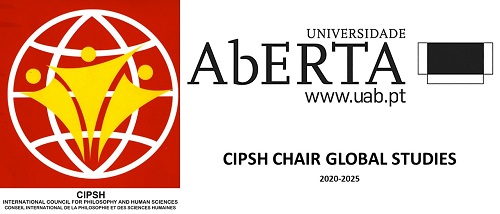
CIPSH-UA Chair on Global Studies, at Aberta University (chair older Prof. José Eduardo Franco). The Chair includes a Doctoral Program in Global Studies of the Aberta University providing a specialized learning process and a research path articulated with a cycle of studies, also including the integration of research projects managed by international students and experts, with various publications, including a peer-reviewed journal, Journal in Global Studies. The project is in tune with the objectives of CIPSH (www.cipsh.net), since the doctoral program plans the confluence of humanities and natural and social sciences, and culture, relating them to the phenomenon of globalization, also closely related to the research and publication projects only made possible with the establishment of a network between institutions and experts, where dissemination and debates can occur in an effective way, also targeting general audiences. The Chair promotes the use of Portuguese language internationally, and in partnership with Spanish and French universities, for global linguistic diversity, within CIPSH’s Global History of Humanity project.
CIPSH created the CIPSH Chair project not only to make up for the lack of attention to the humanities in the existing UNESCO program but also to patch up its own inherent character as an umbrella organization of academic disciplines, in need of including interdisciplinary research that’s increasingly important in the development of humanities recently. Furthermore, in terms of institutional structure, as the organization of international federation and associations, CIPSH had not been able to establish effective working relations with leading research universities and centers, which had clearly taken the lead in defining intellectual direction and organizing academic activities. At the first World Humanities Conference (WHC) in 2017 in Liege, the CIPSH Chair was introduced by the General Assembly as a constructive approach to rekindle academic life while enhance interdisciplinarity and increase networking with research universities worldwide.
My CIPSH Chair on “New Humanities” at the University of California at Irvine was designed clearly to address these concerns suggested by CIPSH leaders.
Rooted in lifelong research on socio-cultural history on such groundbreaking subjects such as childhood studies and materiality. My own double training in history (PhD at Brown, 1983) and science (Public Health at Harvard , 1992) ensured an interdisciplinary approach. The fresh look at food cultures in Asia and comparative digital humanities undertaken by my CIPSH chair indicated such an intellectual cross fertilization promised by the CIPSH Chair in New Humanities from the outset. My labor in founding the Asian New Humanities Net twenty years ago, now an active member of CIPSH, showed the insightful view behind the program that this CIPSH Chair concurred.
For establishing close collaborative partnerships with leading research institutions, we can hardly find a better anchor than UC Irvine, home to the world renowned UCHRI. Following this, this CIPSH Chair is then complimented by the support of research universities in Asia, North America, and Europe as its outstanding supporting partners. Over the past few years, conferences held in Shanghai Jiaotong U, Fudan U, Xiamen U, McGill, UCLA, UCSD, Gottingen, Chinese Academy of Science, National Taiwan U, Keio U, Tokyo U, have amply demonstrated the strengths of this new partnership between new humanities and forward-looking institutions combining arts and sciences.
This CIPSH Chair on New Humanities will continue to focus on deep interdisciplinary work across humanities and sciences, as intellectual renewal after regional studies as its outstanding features. Childhood studies and Food Culture being the specific fields it would demonstrate its academic strength together with its institutional partners while working with special initiatives in the growth of CIPSH.
Most of the partners (such as McGill, SJTU, Hangseng U of HK, Hangzhou Normal U) consist of ongoing collaborations from the first 5 years of this Chair, while a few represent unfolding of newer work relations (Son Gang U , Taipei Medical U, and National Donghua U).
Continuous mutual enhancement with CIPSH itself shall be evident in the nurturing of the Health Humanities ( with Tony Chen at School of Public Health at National Taiwan U), Techno Humanities (with Peng Qinglong at Shanghai Jiaotong U), and the creation and development of the CIPSH Academy (supported by the CCK Foundation).
The following is a tentative activity plan for 2024-29 at/with partner institutions:
- Annual residence in UC Irvine Humanities School and Humanities Center.
- 2025: McGill University, together with UNESCO Chair, Colloquium on “From Regional Studies to Global Humanities”.
- 2026: Workshop at the College of Education, Hangzhou Normal U, together with Northeastern Normal U in Changchun, and translation and publication series on history of childhood of the world, at Shanghai Education Press.
- 2027: Workshop at Global Humanities Initiative and Asian New Humanities Net at Hangseng University of HK, together with National Donghua University in Hualian, Taiwan, on “Food in Transition and Translation.”
- 2028: Seminar on Oral Hygiene, Health, in Arts and Philosophy (based on annual short two-week course on Medical Humanities).
- 2029: Humanities Summit on “University as the Foundation of Academic Humanities” (possibly at UC Irvine).
- Collaborative events with other CIPSH Chairs, e.g. with Lim J. H. Chair on “Global East” in South Korea.
CIPSH-UL Chair on Digital Humanities in Education
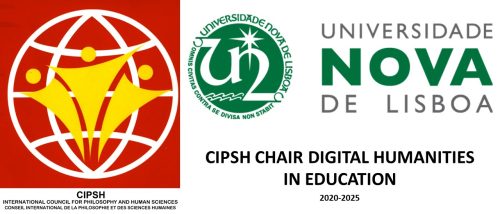
CIPSH-UL Chair on Digital Humanities in Education, at Nova University (chair older Prof. Carlos Ceia). The COVID-19 pandemic and the generalized use of digital resources has emphasized the importance of virtual communication across national and social borders. At a time described as ‘posthuman’, an information-intensive age, our globalized societies face increasing challenges, and the Humanities have a renewed role to play, addressing discourses that feed on fear, misinformation, knowledge manipulation, fake news, and science denial. To critically rethink the (cognitive) humanities and their educational value, universities should overcome disciplinary boundaries and connect with the civil society by bridging theory and action and exploring the potential of digital literacy and digital resources. Moreover, the critical importance of teachers for global citizenship and sustainable development demands pre-service and in-service teacher education that reaches geographical areas typically non- or underrepresented in research studies supported in a vision of education as a catalyst for change for an interconnected, inclusive, equitable, intercultural, and sustainable world.
CIPSH-UHH Chair Diversity of Mathematical Research Practices and Cultures
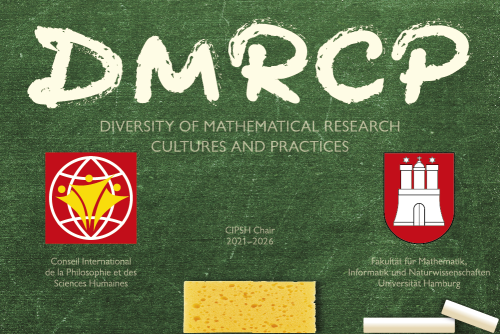
The CIPSH Chair DMRCP is a research network working on the diversity of mathematical research cultures and practices. It aims to understand mathematics as a human discipline driven by interaction, encompassing all its philosophical, sociological, cognitive, historical, and didactical aspects in contrast to the image of mathematics as a cerebral discipline performed by individuals in pensive isolation without social interaction.
DMRCP studies mathematical research cultures and practices using methods from the empirical social sciences and the humanities, with a particular focus on the effect that differences in research cultures and practices have on mathematics. In that, it relies on researchers from many disciplines and countries and understands itself as the coordinating infrastructure for this community.
DMRCP is chaired by Benedikt Löwe and governed by its Council consisting of experienced scholars of the field. Formally, the CIPSH Chair DMRCP is hosted by the Fakultät für Mathematik, Informatik und Naturwissenschaften der Universität Hamburg based on an agreement with the Conseil International de Philosophie et des Sciences Humaines (CIPSH).
Chair-holder. Prof. Dr. Benedikt Löwe.
Scientific Coordinator. Deborah Kant, M.Sc.
Contact. dmrcp@cipsh.international.
Website. http://dmrcp.cipsh.international/
IPSH-UBD Chair Towards a New Humanism: Spirituality and Secularity in the Modern World
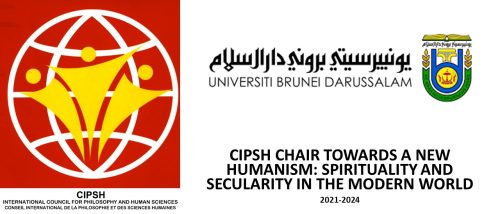
CIPSH-UBD Chair Towards a New Humanism: Spirituality and Secularity in the Modern World, at the University of Brunei Darussalam (chair holder Prof. Tong Chee Kiong).
CIPSH-HSUHK Chair in Cultural Heritage and Creative Humanities

The International Council for Philosophy and Human Sciences (CIPSH) has established the CIPSH Chair for Cultural Heritage and Creative Humanities at HSUHK. Professor Desmond Hui, Head of the Department of Art and Design, will serve as the Chairholder for the next five years, with effect from 1 August 2024.
The CIPSH Chair in Cultural Heritage and Creative Humanities, which is a university-wide cultural project, will focus on establishing links with the North-South alliance in terms of building capacity and facilitating the transfer of knowledge in creative humanities and cultural heritage management, an effort that is critically needed in many parts of the world today. With the organisation of conferences, workshops, research and publications, the project will contribute to CIPSH’s global priorities in the short and long term.
Professor Desmond Hui is the Programme Director of the MA in Cultural Heritage Management programme, Chairman of the Advisory Committee on Built Heritage Conservation, as well as Chairman of the Art Subcommittee of the Museum Advisory Committee in Hong Kong. He is also among the Expert Facility for UNESCO’s “Culture|2030 Indicators” initiative and was a part of the UNESCO 2005 Convention on the Protection and Promotion of the Diversity of Cultural Expressions.
CIPSH-UCAS Chair on Time: Conceptions, Experiences, and Expressions
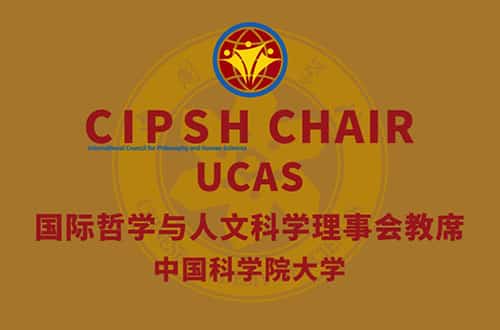
CIPSH-UCAS Chair on Time: Conceptions, Experiences, and Expressions (Time-CEE) at the University of Chinese Academy of Sciences (UCAS), held by Prof. Xiaochun Sun, includes a Doctoral Program in the History of Science and Technology. Established within the School of Humanities at UCAS in Beijing, the Time-CEE Chair operates in close collaboration with South China Agricultural University (Guangzhou), Lanzhou University (Lanzhou), and other partner institutions. The Chair aims to initiate and coordinate thematic projects exploring the temporal dimensions across diverse fields such as science, philosophy, religion, history, music, literature, and anthropology. This initiative is inherently multi-disciplinary and cross-cultural, engaging various disciplines and perspectives. By fostering interactions between the sciences and the humanities, the UCAS CIPSH Chair on Time-CEE seeks to inspire new insights and visions within the humanities.
CIPSH-UG Legon Chair on Linguistics and Biodiversity
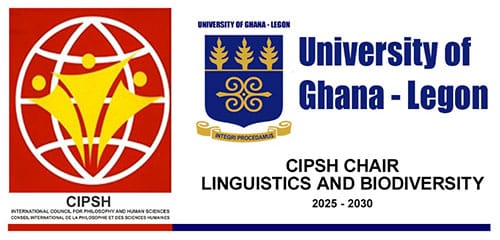
The University of Ghana, Legon, in cooperation with the International Council of Philosophy and Human Sciences (CIPSH), a UNESCO institution, has established a research Chair designated as “CIPSH-UG Legon Chair in Linguistics and Bio-Diversity” at its School of Languages, within the College of Humanities with Professor Adams Bodomo as Chairholder, effective January 2025 and running for five years.
The Chair aims to enhance the understanding of the interconnection between biodiversity and linguistic diversity, initially focusing on four African languages: Dagaare, Twi, Hausa, and Swahili. Data collection will be conducted in at least three locations per language, documenting vocabularies, terminologies, and linguistic expressions related to economic and medicinal plants and animals in these indigenous languages. By doing so, the Chair seeks to deepen linguistic and cultural knowledge of the natural environment, contributing to biodiversity preservation.
In collaboration with universities and research institutions in Ghana, Austria, and beyond, the Chair will offer (or facilitate in offering) academic programs for undergraduate, master’s, and doctoral students; organize symposia, workshops, and conferences; and publish research on linguistics and biodiversity. A key initiative includes establishing a peer-reviewed Journal of Linguistics and Biodiversity. This project aligns seamlessly with CIPSH’s and UNESCO’s mission to promote academic humanities and support projects that are interdisciplinary in nature.
CIPSH Chair on Geoethics (CIPSH-GC)

Chair holder: Prof. PhD. Silvia Peppoloni (Istituto Nazionale di Geofisica e Vulcanologia, Rome, Italy)
Summary
The CIPSH Chair on Geoethics is focused on creating a research network aimed at developing discussions on a global ethics grounded in geoethics, i.e. an ethics of responsibility towards the Earth system, through the lens of different cultural perspectives. Geoethics, initially developed to address the ethical and social implications of geoscience knowledge and practice, needs interdisciplinary approaches to develop its potential as an ethics capable of fostering planetary ecological humanism. In this perspective, geoethics is the meeting point between geosciences, humanities and social sciences. The cooperation between scholars with different disciplinary backgrounds is the challenge for dealing with the anthropogenic global changes of social-ecological systems and creating pathways for responsible human progress. From this point of view, the goals of the CIPSH Chair on Geoethics are in line with the CIPSH’s mission of favoring the exchange of knowledge among scholars from different disciplines, international cooperation, and the promotion of the richness and diversity of cultures.
The CIPSH Chair on Geoethics is established at the Istituto Nazionale di Geofisica e Vulcanologia (INGV), Rome, Italy and supported by the International Association for Promoting Geoethics (IAPG). Finally, it is part of the International Geoethics Research Infrastructure (IGRI).
Objectives
The CIPSH Chair on Geoethics will expand and reinforce an international research network of institutions, non-governmental organizations, and scholars to foster interdisciplinary initiatives for bridging geosciences, humanities, and social sciences through geoethics, with the goal of continuing to create a geoethical framework for addressing the complexity of ecological crises and contributing to pursue the Sustainable Development Goals of the United Nations.
The long-term objective is to strengthen an already existing international community of scholars with different disciplinary background dealing with geoethics and to involve other individuals and institutions/organizations in this international network in order to deepen discussions about geoethics and to improve its theoretical structure and practical applications in a wide range of disciplines, favoring a cross-disciplinary fertilization.
Website: https://www.geoethics.org/cipsh-cg
UNESCO Chairs Associated with CIPSH
- UNESCO-IPT Chair: Humanities and Cultural Integrated Landscape Management
- UNESCO-UFSC Chair: Language Policies for Multilingualism
- UNESCO-UFSM Chair: Borders and Migrations
- UNESCO-UJ Chair: Global Understanding for Sustainability
